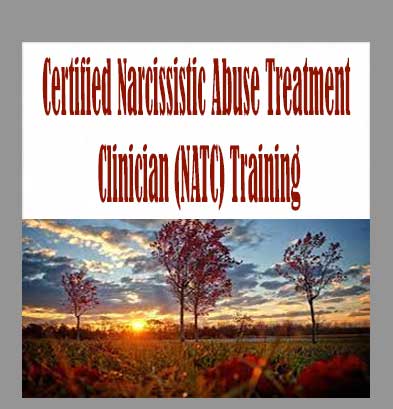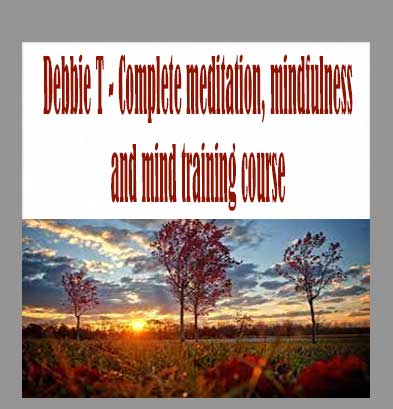
Description
Certified Narcissistic Abuse Treatment Clinician (NATC) Training with Dr. Ramani Durvasula download , Certified Narcissistic Abuse Treatment Clinician (NATC) Training with Dr. Ramani Durvasula review , Certified Narcissistic Abuse Treatment Clinician (NATC) Training with Dr. Ramani Durvasula free
Certified Narcissistic Abuse Treatment Clinician (NATC) Training with Dr. Ramani Durvasula
Join Dr. Ramani Durvasula, Psychologist, Author, and the world’s most highly recognized expert
on the topic of narcissistic abuse/antagonistic relational stress
Working with clients experiencing narcissistic abuse and antagonistic relationships is unlike other clinical issues that will show up in our offices because of the complexity and misconceptions…
… and there are many factors to consider, including the nature of the relationship, the length and impact of the abuse, the status of the relationship, the welfare of children and family, and the potential legal and financial fallout.
As therapists, if we don’t provide the right guidance, there’s a good chance that clients will experience ongoing negative mental health impacts.
For these cases, it’s crucial that you have a framework that’s designed to navigate the unique challenges for your clients who are in relationships with people who have narcissistic and antagonistic personality styles.
That’s why we’re thrilled to partner with Dr. Ramani for this comprehensive training program that’s the culmination of her decades of work exploring narcissism, antagonism, and narcissistic relationships and systems.
Join this training that will provide you with the knowledge and skills you need … so you can feel confident and equipped to work with narcissistic abuse survivors.
With this program, you’ll get access to tailored instruction, real-world vignettes, and a transtheoretical approach for addressing narcissistic abuse and master the skills you need to…
- Work with this client population in a culturally competent manner
- Integrate an antagonism-informed treatment model
- Apply trauma-informed models of care
- Handle the ethical issues that are common with these cases
- And much more!
You’ll end this program with the skills, knowledge, and a complete treatment framework, so you can confidently work with clients experiencing narcissistic abuse …
A Personal Invitation from Dr. Ramani Durvasula
As a psychologist, author, researcher, and educator, I’ve been leading the efforts to help clients experiencing the harms of narcissistic and antagonistic relationships.
I’m excited to invite you to join me for this certification program that brings together decades of research and clinical experience …
… into this comprehensive, on-demand program that will equip you to provide effective care for clients experiencing narcissistic and antagonistic relationships.
Join me, along with two of my highly esteemed colleagues, and you’ll get access to training on the phenomenology of narcissism and antagonism, the dynamics of these relationships, and crucial insights complemented by real-world case scenarios that provide the practical guidance you need for all your legal, ethical, and clinical challenges that arise when working with clients experiencing these relationships.
This is your unique opportunity to be equipped with a comprehensive and customizable treatment framework, so you feel empowered to meet these clients where they are at.
Our clients are in desperate need of help to cope, understand, and break out of longstanding cycles of self-blame, self-doubt, and confusion. We invite you to be part of the world-class group of clinicians who are prepared with the skills, knowledge, and confidence to offer truly effective care to these clients.
I’m so thrilled to have you join me and heartened to know that more clinicians will be prepared to work with a group of clients that has long been underserved!
Your Steps to Become a Certified Narcissistic Abuse Treatment Clinician
Join Dr. Ramani for eight engaging modules that are designed to equip you with the skills and insight to work with narcissism and antagonistic relational stress.
Through real-world case vignettes and experiential learning sessions, you’ll discover a comprehensive roadmap to address narcissistic abuse – including how to apply trauma-informed models and manage the ethical issues that are common with these cases.
Once you’ve finished this training, you’ll become a recognized narcissistic abuse treatment therapist and be fully prepared to help your clients take back their lives!
Module 1: Narcissistic Abuse In-Depth Workshop with Ramani Durvasula
To be effective in working with clients experiencing narcissistic abuse, you must understand the range of antagonistic personality styles – so you can provide clear guidance for your clients.
In this first module, you’ll join Dr. Ramani to dive DEEP into the what, why, and how of narcissism and other antagonistic styles. Through review of diagnostic and phenomenological frameworks, current research, case examples and real-world discussions, you’ll end this module equipped with the essential insight you need to provide high-quality psychoeducation.
Skill-building opportunities in this module include:
- Building a strong working knowledge of how narcissism and antagonistic personality styles operate that goes beyond traditional and limited diagnostic criteria.
- Developing a crucial understanding of existing treatment models and best practices for working with clients with narcissistic personalities.
- Being aware of co-occurring issues that show up with narcissism, including addictions, ADHD, mood issues, and compulsive sexual behavior.
- Understanding how narcissistic personality styles translate into the problematic interpersonal behavior we witness in narcissistic relationships.
- Becoming familiarized with other “narcissism-adjacent” personality styles that have antagonistic characteristics including psychopathy.
Module 2: Dynamics of Narcissistic and Antagonistic Relationships
In this module, Dr. Ramani introduces her approach for working with narcissistic relationships. Using an in-depth case example, she illustrates how Narcissistic and Antagonistic Relationships (NA/ARS) may be revealed in the clinical setting.
Next, Dr. Ramani provides an in-depth exploration of the dynamics of narcissistic relationships. You’ll discover the key characteristics of these relationships and explore important topics including betrayal trauma, trauma-bonding, attachment, enabling, and more, and specifically how these themes show up in clients in intimate relationships characterized by narcissism and antagonism. You’ll also learn about the narcissistic family system and discover how these often establish roles and patterns that impact adult mental health and relational functioning. Expanding beyond the family, you’ll discover how the narcissistic system can play out in other relationships, including workplace relationships and friendships.
In this module you’ll discover:
- The dynamics, patterns, and asymmetries of narcissistic/antagonistic relationships.
- The phases of the narcissistic/antagonistic relationship cycle.
- How attachment impacts and is impacted by narcissistic/antagonistic relationship dynamics.
- How our clients get drawn into these relationships and how they get stuck.
- The family and systemic roles people may fall into in a narcissistic/antagonistic family system or other relational systems.
Module 3: Trauma and Narcissism: Personality Disorders as Trauma-Related Disorders
In this module, world-renowned trauma specialist, Dr. Janina Fisher, shares critical insights about the relationship between trauma and narcissism. You’ll discover the impact of trauma on the brain and how these manifest as symptoms of mental health diagnoses – including narcissistic and antagonistic personality styles.
Janina will then share her revolutionary conceptualization of narcissism and reveal some of the drivers of antagonistic behaviors. Finally, you’ll discover how to use parts language to drastically improve your clinical work with both narcissistic clients and those experiencing narcissistic abuse.
Skill-building opportunities in this module include:
- Understanding why it’s so difficult for many clients to leave abusive relationships and partners.
- Identifying the biggest mistakes trauma therapists often make when working with clients experiencing narcissistic abuse.
- Viewing narcissistic behavior through the lens of a parts model.
- Discover how understanding, unblending and integration can help your work with clients experiencing narcissistic relationships.
- Provide a framework for helping clients understand their complex reactions to these relationships.
Module 4: Working with the Fallout of Narcissistic Abuse
It’s essential that clinicians understand not just the phenomenon of narcissistic abuse/antagonistic relational stress (NA/ARS) – but also the fallout from it. In this module, you’ll discover the core characteristics of NA/ARS relationships and what this does to clients who are in these relationships.
You’ll explore these relational patterns using case examples and discover the psychosocial, behavioral, cognitive, interpersonal, and physical presentations we observe in clients experiencing narcissistic and antagonistic relationships.
Skill-building opportunities in this module include:
- Observing the signs of NA/ARS relationships and the subsequent fallout of these dynamics in your clients.
- Learning how to help your clients recognize how their subjective experiences relate to the patterns occurring in their relationship.
- Differentiating between NA/ARS and other mental health issues such as PTSD, complex PTSD, co-dependency, anxiety disorders, mood disorders, and other mental health issues, as well as understanding the co-occurrence of these patterns.
- Developing a treatment plan that includes a framework for guiding your clients from awareness of their experiences to enacting change.
Module 5: Being Culturally and Intersectionally Informed When Working with Clients Experiencing NA/ARS
Narcissistic Abuse/Antagonistic Relational Stress (NA/ARS) does not occur in a vacuum. There are cultural, intersectional, and systemic factors that impact our clients in these relationships. The asymmetries that are inherent in narcissistic and antagonistic relationships are magnified for clients who experience greater marginalization based on their identities. In addition, cultural and societal issues related to relationships and family must be integrated into any work with clients experiencing these relational dynamics.
In this module, Dr. Ramani will highlight the need to apply guidelines for cultural competency and cultural humility, frame this work using a social-ecological model, and give you the tools and awareness you need to practice as a culturally and intersectionally informed therapist.
Skill-building opportunities in this module include:
- Assessing and determining the intersectional cultural and systemic factors that may be impacting your client’s experience with NA/ARS.
- Fostering a therapeutic stance of humility and flexibility, so you are optimally able to provide culturally and intersectionally-informed care.
- Identify your own unique intersectional identities to inform cultural humility and awareness of their impact on your client.
- Develop a treatment plan that accounts for intersectional factors and structural inequities.
Module 6 & 7: Working with Clients Experiencing NA/ARS: An antagonism-informed treatment approach
In these modules, Dr. Ramani guides you through her framework for treating clients who have experienced Narcissistic Abuse/Antagonistic Relational Stress (NA/ARS). This approach is transtheoretical and can be integrated into existing theoretical orientations you are already successfully implementing with clients. From the conceptual to the practical, you’ll get exposure to the knowledge and skills you need to navigate clinical work with these clients.
Through detailed case discussions, Dr. Ramani will demonstrate how to apply this approach with a broad range of clients experiencing NA/ARS. You’ll also learn about the best practices for treating NA/ARS and discover how to apply and customize these interventions to the clients and populations you work with…
… so, you’re prepared for your next session with a narcissistic abuse survivor.
Skill-building opportunities in the modules include:
- Learning how to conduct evaluation and comprehensive assessment of NA/ARS with clients experiencing a broad range of relationship types including familial, romantic, social and occupational.
- Setting treatment goals based on your client’s specific NA/ARS-related relationship and experience.
- Helping clients overcome the fallout of their abuse, implement psychoeducation and radical acceptance, process the grief that this work can evoke in clients, validate the client’s experience, address client ambivalence, manage co-occurring mental health issues, and slowly unfold the experience of individuation – whether they remain in the relationship or end it.
- Becoming equipped with a full treatment framework that includes areas of focus, strategies and interventions, and navigation of the myriad challenges of this work.
Module 8: Legal and Ethical Considerations for Working with Narcissism and NA/ARS
Whether your client is navigating divorce, child custody, or other legal proceedings, it’s essential that you understand your role and the resources that are available to you to navigate the court system. It is also crucial to understand some of the standard legal and ethical issues relevant to practice that can become complex when working with clients managing narcissistic/antagonistic relationships.
In this module, forensic psychologist Dr. Catherine Barrett shares her extensive experience and expertise in the legal, ethical, and forensic issues related to working with clients experiencing narcissistic and antagonistic relationships, domestic violence, and coercive control. This module also explores standard issues such as confidentiality and privilege, suicidality, dangerousness, and clinician self-awareness and highlights the unique issues raised for clients experiencing NA/ARS.
You’ll discover how to navigate:
- Issues related to risk, including safety concerns, suicidality and mandated reporting
- Confidentiality and privilege when working with both adults and minors.
- Documentation, access to records, and providing testimony.
- Protecting yourself, including limits of competency, scope of practice and malpractice insurance
- The use of social media, sharing testimonials and protecting your client’s identity
- Understanding coercive control and the legal standards involved
- Family court and working with clients navigating family court.
- Accessing supervision and consultation.
MEET THE PRESENTERS
Ramani Durvasula, PhD, LCP, is the world’s most highly recognized expert on the topic of narcissistic abuse and its impact on relationships. Her work has been widely featured in digital and print media, television, and documentaries including on CNN, TEDx, Red Table Talk, the Today Show, and Investigation Discovery. Her YouTube channel and videos have been viewed over 170 million times, and she is the host of the critically acclaimed podcast Navigating Narcissism.
Dr. Ramani Durvasula is a psychologist and the founder of LUNA Education, Training and Consulting, LLC. She’s professor emerita of psychology at California State University Los Angeles and the author of multiple books, including It’s Not You: Identifying and Healing from Narcissistic People, Don’t You Know Who I Am: How to Stay Sane in the Era of Narcissism, Entitlement and Incivility and Should I Stay or Should I Go: Surviving a Relationship With a Narcissist.
Janina Fisher, PhD, is a licensed clinical psychologist and former instructor at The Trauma Center, a research and treatment center founded by Bessel van der Kolk. Known as an expert on the treatment of trauma, Dr. Fisher has also been treating individuals, couples, and families since 1980.
She is past president of the New England Society for the Treatment of Trauma and Dissociation, an EMDR International Association Credit Provider, Assistant Educational Director of the Sensorimotor Psychotherapy Institute, and a former Instructor at Harvard Medical School. Dr. Fisher lectures and teaches nationally and internationally on topics related to the integration of the neurobiological research and newer trauma treatment paradigms into traditional therapeutic modalities.
Dr. Catherine Barrett is a licensed Clinical Forensic Psychologist, based out of Los Angeles, California. She first gained clinical experience after graduating from University of Southern California in 2009, with a Masters degree in Marriage and Family Therapy. Through her training and experience, she has worked with marginalized communities, committed to social justice in mental health, and has developed a practice that is not only cross-culturally competent, but affirmative.
Clinical training and populations include addiction recovery, LGBTQ+, domestic and intimate partner violence, chronic mental illness, and narcissistic personality disorder. Dr. Barrett specializes in narcissistic abuse recovery.
Frequently Asked Questions:
- Innovative Business Model:
- Embrace the reality of a genuine business! Our approach involves forming a group buy, where we collectively share the costs among members. Using these funds, we purchase sought-after courses from sale pages and make them accessible to individuals facing financial constraints. Despite potential reservations from the authors, our customers appreciate the affordability and accessibility we provide.
- The Legal Landscape: Yes and No:
- The legality of our operations falls into a gray area. While we lack explicit approval from the course authors for resale, there’s a technicality at play. When procuring the course, the author didn’t specify any restrictions on resale. This legal nuance presents both an opportunity for us and a boon for those seeking budget-friendly access.
- Quality Assurance: Unveiling the Real Deal:
- Delving into the heart of the matter – quality. Acquiring the course directly from the sale page ensures that all documents and materials are identical to those obtained through conventional means. However, our differentiator lies in going beyond personal study; we take an extra step by reselling. It’s important to note that we are not the official course providers, meaning certain premium services aren’t included in our package:
- No coaching calls or scheduled sessions with the author.
- No access to the author’s private Facebook group or web portal.
- No entry to the author’s exclusive membership forum.
- No direct email support from the author or their team.
We operate independently, aiming to bridge the affordability gap without the additional services offered by official course channels. Your understanding of our unique approach is greatly appreciated.
- Delving into the heart of the matter – quality. Acquiring the course directly from the sale page ensures that all documents and materials are identical to those obtained through conventional means. However, our differentiator lies in going beyond personal study; we take an extra step by reselling. It’s important to note that we are not the official course providers, meaning certain premium services aren’t included in our package:
Refund is acceptable:
- Firstly, item is not as explained
- Secondly, Item do not work the way it should.
- Thirdly, and most importantly, support extension can not be used.
Thank you for choosing us! We’re so happy that you feel comfortable enough with us to forward your business here.








Reviews
There are no reviews yet.